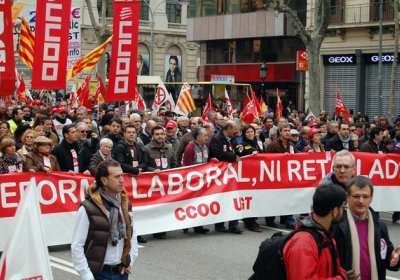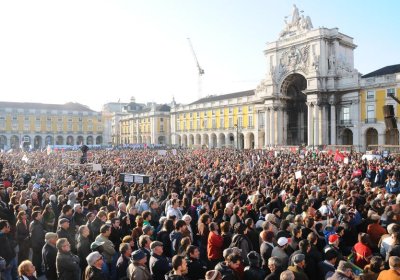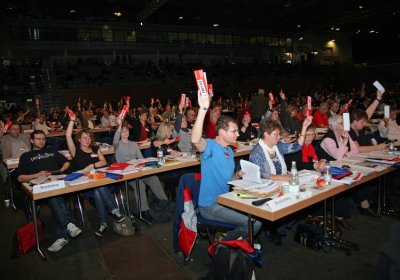Since its November 20 election triumph, the administration of Spanish Popular Party (PP) Prime Minister Mariano Rajoy has launched such a blitzkrieg of neoliberal policies, less democratic rights, state centralism and conservative social values that at times it seems as if the country has gone back 40 years in four weeks.
Rajoy’s is not just one more example of a new government breaking promises due to “shocking revelations” that its predecessors had left the cupboard bare. (That old ruse has already led to public sector salary cuts of up to €500 a month.)
Dick Nichols
Last year it was the indignado movement that filled Spain’s city squares with hundreds of thousands of protesters. On February 19, it was the union-led movement against the Popular Party (PP) government’s new labour law.
On February 29, another mass protest flooded the squares: tens of thousands of students protesting against cuts to education in 25 cities and towns across Spain.
They had paid no attention to the plea of Prime Minister Mariano Rajoy, who on the eve of the protest asked Spaniards “to understand that things are not that easy”.
Huge support
How would you feel if you woke up to the breakfast radio news announcing that Green Left Weekly had just published its last issue?
The left in Spain had that experience on February 24, when we learned that this would be the last day the progressive daily Publico appeared on the country’s newsstands (the online version continues).
Will the Spanish economy benefit from Prime Minister Mariano Rajoy government’s anti-worker labour market reform?
Fifty-seven Spanish cities and towns came to a stop on February 19. Up to 2 million people marched in protest against the new labour “reform” of Prime Minister Mariano Rajoy's Popular Party (PP) government.
The marches brought together veterans of the struggle for union and worker rights under the Franco dictatorship, activists from the 1970s “transition to democracy” and today’s indignados.
“Old” slogans (“If you don’t fight, you lose”) mixed with new (“They piss on us and say it’s raining”).
How will Spain’s new labour "reform" — announced on February 10 by employment and social security minister Fátima Báñez and already in force as a royal decree before adoption by parliament—affect Spain’s workers and unemployed?
First, imagine the essence of 30 years of Australian anti-worker and anti-union law — from Hawke’s Accord through Keating’s enterprise bargaining and Howard’s Workplace Relations Act to Work Choices and the Fair Work Act — but all rolled into one bill.
Lisbon's vast Palace Square became People's Square on February 12. More than 300,000 workers, young people, unemployed and pensioners from across Portugal marched to voice their rejection of cutbacks inflicted by Prime Minister Pedro Passos Coelho's government. It was the country's biggest demonstration in 30 years. Photo slide shows of the mass march can be seen here and here
A vast icy pool of Siberian air, the coldest in 50 years, settled over all Europe in late January. At least 150 people without shelter were killed.
Yet the suffering from this extreme cold snap will be nothing compared with that of the economic ice age now threatening to entomb Europe’s most vulnerable economies.
Over the past fortnight southern Europe’s growth prospects have become increasingly wintry:
As you read these words, disaster may be about to strike in the galloping crisis of the European financial system and the euro. Or it may not — yet.
On November 30, the imminent threat of a banking system implosion stirred the European Central Bank (ECB), the US Federal Reserve, Bank of England and central banks of Japan, Canada and Switzerland, into taking the minimum action needed to prevent a “Lehman Brothers event” collapsing the European financial system.
The November 20 Spanish election went as the polls had forecast: the Spanish Socialist Workers Party (PSOE) government was massacred, with its lowest vote in 34 years. The right-wing Popular Party got a 186-seat absolute majority in the 350-seat parliament and left and left-nationalist forces emerged stronger, led by the United Left (IU) and Amaiur, the Basque left-nationalist coalition.
Late on October 23, the culminating vote of the program congress of the German Left Party (Die Linke) came in Erfurt’s cavernous Congress Centre: 503 delegates raised their voting cards to support the document as finally amended by the congress, with only four against and 12 abstentions.
Die Linke has operated since 2007 on the basis of the “programmatic key points” that created Die Linke from the fusion of the Party of Democratic Socialism (PDS) and the Electoral Alternative for Labour and Social Justice (WASG).
World financial markets are increasingly staking billions on a bet that the eurozone is on its last legs. This bet on a euro break-up is looking more and more realistic, particularly because it becomes increasingly self-fulfilling as austerity programs bite and economic growth slows across Europe.
A very vicious circle is at work. Because of the rising wariness of financial institutions, in recent weeks the price of Italian and Spanish 10-year bonds has fallen. Their yield rose above 7% (bond prices and yields move in opposite directions).
- Previous page
- Page 21
- Next page









